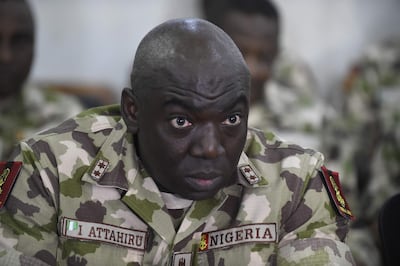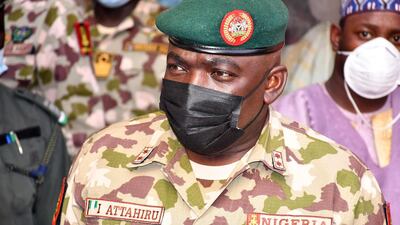Nigeria's militray chief and other officers were killed on Friday when their plane crashed in bad weather in the country's north, officials said.
Lt Gen Ibrahim Attahiru was appointed chief of army staff by President Muhammadu Buhari in January as part of a shake-up of Nigeria's military command to better fight surging violence and a more than decade-long extremist insurgency.
His death came amid reports that the leader of Nigeria's Boko Haram extremist group, Abubakar Shekau, had been seriously wounded or possibly killed after clashes with a rival faction allied to ISIS.

President Buhari, a former general first elected in 2015, has been under increasing pressure from allies and critics alike over his government's handling of mounting security problems in Africa's most populous country.
Mr Buhari said the crash "was one mortal blow to our underbelly, at a time our armed forces are poised to end the security challenges facing the country".
The army spokesman said on Twitter that 10 other officers including the plane's crew also died in the crash in Kaduna state.
The plane crashed at Kaduna International Airport "due to inclement weather", the armed forces said.
Nigeria's military has been battling the Boko Haram insurgency in the north-east since 2009, a conflict that has killed more than 40,000 people and displaced about two million.
Attahiru led an offensive against Shekau in the north-east in 2017.
Local intelligence sources said Shekau was seriously wounded earlier in the week when ISIS-allied rival fighters attacked his stronghold in the Sambisa forest in the north-eastern state of Borno.
Sources said Shekau was wounded when he shot himself to try to evade capture after militants from the Islamic State in West Africa Province (ISWAP) surrounded him following a series of battles.
Nigeria news outlets have been filled with unconfirmed reports about the death of the man who made international headlines in 2014 when his fighters kidnapped nearly 300 schoolgirls from the remote town of Chibok.
A local intelligence source said on Friday that Shekau died from his wounds in Nainawa village on Thursday and "buried in the night in an unmarked grave to avoid exhumation by either the Nigerian military" or rival fighters.
The Boko Haram leader has been reported killed several times, only to reappear later.
Nigeria's army has said it was still investigating the reports and neither ISWAP or Boko Haram have issued any statements about the Sambisa attack or Shekau's whereabouts.
But analysts said his loss would be a huge blow to his Boko Haram faction and potentially allow ISWAP to consolidate its territorial control in Nigeria's north-east.
ISWAP has emerged as the dominant force in Nigeria's conflict, showing a sustained ability to carry out complex attacks on the military and recently overrunning several army bases.

